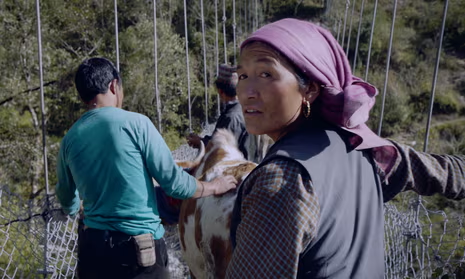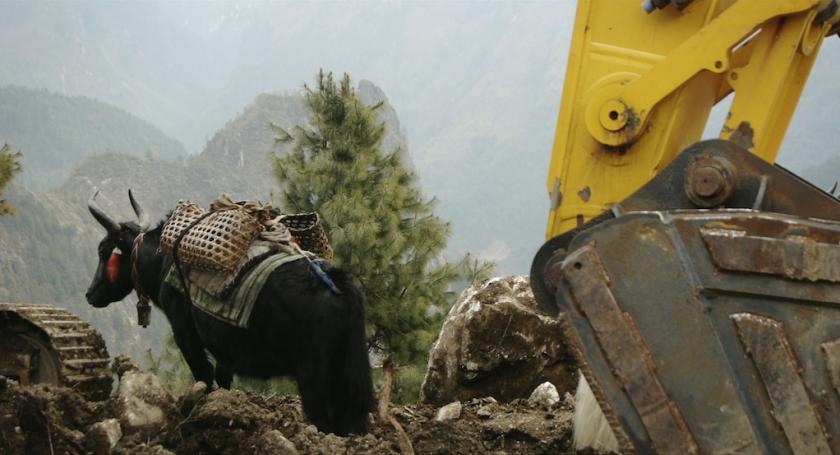It doesn’t do to be in a hurry in Nepal. In Baato, directors Kate Stryker and Lucas Millard follow Mikma and her family as they travel 300 kilometres from their mountain village in Eastern Nepal to the town of Terai. It takes the best part of a week for the five adults, two boys, and two dogs to walk the narrow paths until they reach the unpaved road where they can board rickety buses or jeeps to complete their journey.
The trip is an annual event. Every winter for hundreds of years, villagers have been making the journey south to sell medicinal herbs gathered over the summer months in the surrounding forests. It’s the main source of income and the baskets they carry suspended from their foreheads are filled with plants such as chirata, which is the basis of paracetamol, and yarsagumba (caterpillar fungus), which they hide from the police lest it be confiscated.
The film is not only about their arduous journey, though, but a region undergoing dramatic change. It opens with a beautifully tranquil shot of the Upper Arun River Valley where Mikma’s village sits on a high plateau above the steep, wooded slopes. But the sound of distant machinery warns that a road is being carved over the mountainous terrain. The villagers watch its approach with a mixture of excitement and anxiety. (Pictured below: Mikma)
 A man whose house and fields lie directly in the road's path pleads with the surveyor to change course. Good-natured haggling ensues and for the price of a rooster, a goat, and 10,000 rupees the surveyor agrees to reroute the track around the man’s property.
A man whose house and fields lie directly in the road's path pleads with the surveyor to change course. Good-natured haggling ensues and for the price of a rooster, a goat, and 10,000 rupees the surveyor agrees to reroute the track around the man’s property.
Passing 150 meters from Mikma’s front door, the road will transform her life and that of all the villagers forever. They seem blissfully unaware, though, of the likely effects on their tightly knit community that access to the wider world will bring.
One woman hopes the road will encourage her son to return to the village he left because, he said, "there's nothing here for me, not even television. And there's no point in having money because there's nothing to buy."
Rather than speculating about the impact of the road on the isolated communities it reaches (and possibly destroys), the directors have focused on creating "a document of what life was like in eastern Nepal before the completion of the Koshi Highway".
They also take a realistic look at the pros and cons of modernisation in the unforgiving conditions. While landslides and thick mud often make the existing mountain roads impassable, even at the best of times the unpaved tracks are so rough and the buses so ancient that they regularly break down. It means that drivers also have to be mechanics and passengers have to be prepared to finish their journey on foot.
Next time I have to wait 10 minutes for a 106 bus, I’ll try to remember that, but I’ll also think about the camaraderie we’ve lost to convenience.
- There'll be a Q&A at the Garden Cinema, London after the 6pm screening on August 2nd
- More film reviews on theartsdesk















Add comment